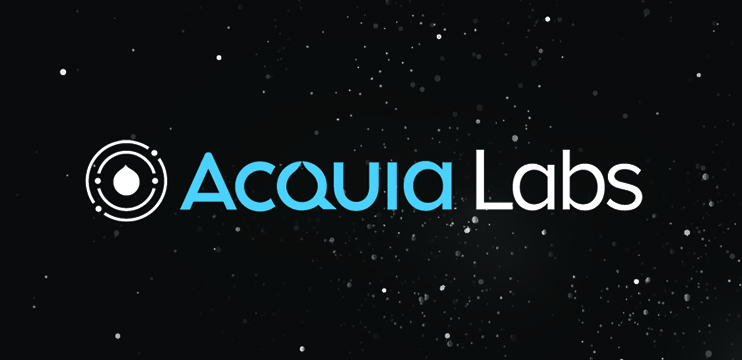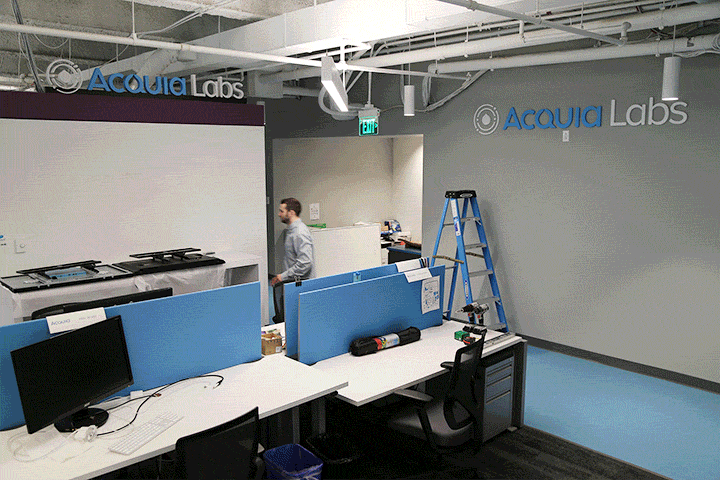Think beyond with Acquia Labs
Acquia looks at how voice assistants and chat bots can move online customer experiences beyond the traditional web page.

For most of the history of the web, the website has been the primary means of consuming content. These days, however, with the introduction of new channels each day, the website is increasingly the bare minimum. Digital experiences can mean anything from connected Internet of Things (IoT) devices, smartphones, chatbots, augmented and virtual reality headsets, and even so-called zero user interfaces which lack the traditional interaction patterns we're used to. More and more, brands are trying to reach customers through browserless experiences and push-, not pull-based, content – often by not accessing the website at all.
Last year, we launched a new initiative called Acquia Labs, our research and innovation lab, part of the Office of the CTO. Acquia Labs aims to link together the new realities in our market, our customers' needs in coming years, and the goals of Acquia's products and open-source efforts in the long term. In this blog post, I'll update you on what we're working on at the moment, what motivates our lab, and how to work with us.

Alexa, ask GeorgiaGov
One of the Acquia Labs' most exciting projects is our ongoing collaboration with GeorgiaGov Interactive. Through an Amazon Echo integration with the Georgia.gov Drupal website, citizens can ask their government questions. Georgia residents will be able to find out how to apply for a fishing license, transfer an out-of-state driver's license, and register to vote just by consulting Alexa, which will also respond with sample follow-up questions to help the user move forward. It's a good example of how conversational interfaces can change civic engagement. Our belief is that conversational content and commerce will come to define many of the interactions we have with brands.
The state of Georgia has always been on the forefront of web accessibility. For example, from 2002 until 2006, Georgia piloted a time-limited text-to-speech telephony service which would allow website information and popular services like driver's license renewal to be offered to citizens. Today, it publishes accessibility standards and works hard to make all of its websites accessible for users of assistive devices. This Alexa integration for Georgia will continue that legacy by making important information about working with state government easy for anyone to access.
And as a testament to the benefits of innovation in open source and our commitment to open-source software, Acquia Labs backported the Drupal 8 module for Amazon Echo to Drupal 7.
Here is a demo video showing an initial prototype of the Alexa integration:
Shopping with chatbots
In addition to physical devices like the Amazon Echo, Acquia Labs has also been thinking about what is ahead for chatbots, another important component of the conversational web. Unlike in-home devices, chatbots are versatile because they can be used across multiple channels, whether on a native mobile application or a desktop website.
The Acquia Labs team built a chatbot demonstrating an integration with the inventory system and recipe collection available on the Drupal website of an imaginary grocery store. In this example, a shopper can interact with a branded chatbot named "Freshbot" to accomplish two common tasks when planning an upcoming barbecue.
First, the user can use the chatbot to choose the best recipes from a list of recommendations with consideration for number of attendees, dietary restrictions, and other criteria. Second, the chatbot can present a shopping list with correct quantities of the ingredients she'll need for the barbecue. The ability to interact with a chatbot assistant rather than having to research and plan everything on your own can make hosting a barbecue a much easier and more efficient experience.
Check out our demo video, "Shopping with chatbots", below:
Collaborating with our customers
Many innovation labs are able to work without outside influence or revenue targets by relying on funding from within the organization. But this can potentially create too much distance between the innovation lab and the needs of the organization's customers. Instead, Acquia Labs explores new ideas by working on jointly funded projects for our clients.
I think this model for innovation is a good approach for the next generation of labs. This vision allows us to help our customers stake ground in new territory while also moving our own internal progress forward. For more about our approach, check out this video from a panel discussion with our Acquia Labs lead Preston So, who introduced some of these ideas at SXSW 2017.
If you're looking at possibilities beyond what our current offerings are capable of today, if you're seeking guidance and help to execute on your own innovation priorities, or if you have a potential project that interests you but is too forward-looking right now, Acquia Labs can help.
Special thanks to Preston So for contributions to this blog post and to Nikhil Deshpande (GeorgiaGov Interactive) and ASH Heath for feedback during the writing process.
—